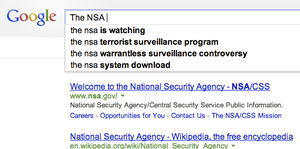
Is the government recording and listening to your every phone call and probing every email for dangerous ideas? Probably—if certain insiders are to be believed. According to one former FBI agent, the US government may indeed keep a massive database where all domestic communications are recorded and stored.
Every day collection systems at the National Security Agency intercept and store 1.7 billion e-mails, phone calls and other types of communications.
On May 1, Tim Clemente, former member of the Joint Terrorism Task force was interviewed by CNN’s Erin Burnett in a segment regarding the FBI’s investigation of alleged Boston marathon bomber Tamerian Tsarnaev’s widow Katherine Russell. Ms. Russell is currently being investigated by Federal authorities to determine if she had any foreknowledge of the Marathon plot, or aided her late husband and brother-in-law to help them elude capture. Specifically, authorities have centered in on a phone call between Russell and Tsarnaev that took place after Tamerian’s photo was released to the public as a person of interest.
During the discussion on CNN, Clemente mentioned that even if Russell did not cooperate with investigators, the authorities would still have the ability to determine the contents of this phone call. In fact, they may have the ability to go back and listen to all phone calls.
CLEMENTE: …We certainly have ways in national security investigations to find out exactly what was said in that conversation. It’s not necessarily something that the FBI is going to want to present in court, but it may help lead the investigation and/or lead to questioning of her. We certainly can find that out. BURNETT: So they can actually get that? We can know what people are saying, that is incredible. CLEMENTE: …Welcome to America. All of that stuff is being captured as we speak whether we know it or like it or not.
Clemente appeared on CNN the following morning to elaborate on his comments with host Carol Costello. During that exchange, Clemente went on to say “there are lots of assets at our disposal throughout the intelligence community… assets [that] allow us to gain information intelligence on things that we can’t use ordinarily in a criminal investigation, but that are used for major terrorism investigations or counter intelligence investigations.”
When asked for more details, Clemente somewhat reluctantly responded “I’m talking about all digital communications are—there’s a way to look at digital communications in the past. I can’t go into detail of how that’s done or what’s done. But I can tell you that no digital communication is secure. So [the conversation between Russell and Tsarnaev] will be found out. The conversation will be known.”
How very Source Code.
We will likely never hear about these monitored conversations in a civilian courtroom where they would be subject to legal scrutiny. However, if Clemente is to be believed—and he does have the counterterrorism bona fides to back his claim—then, to use his words, “all digital communications” in the US are being stored somewhere and are accessible to authorities for perusal after the fact.

This Uber Communication DVR technology may be an outcome of the National Security Agency’s (NSA’s) push to expand its Global Information Grid (GIG) to handle yottabytes of data (10 ^ 24 bytes of data, or a septillionbytes).
The NSA agency website describes the GIG program as “a net-centric system operating in a global context to provide processing, storage, management, and transport of information to support all Department of Defense (DoD), national security, and related Intelligence Community missions and functions – strategic, operational, tactical, and business – in war, in crisis, and in peace.”
So, how vast are the government’s data dragnet? According to a 2010 Washington Post story, “Every day collection systems at the National Security Agency intercept and store 1.7 billion e-mails, phone calls and other types of communications.” Theses communications are the result of both foreign and domestic spying.
The WaPo story specifically profiled the NSA’s communication-monitoring system around the DC area. But the program may soon find a new remote home. Last year, Wired took an in-depth look a new multi-billion dollar NSA complex in the Utah dessert scheduled be completed later this year. According to their report, the complex’s “near-bottomless” databases will store “all forms of communication, including the complete contents of private emails, cell phone calls, and Google searches, as well as all sorts of personal data trails—parking receipts, travel itineraries, bookstore purchases, and other digital ‘pocket litter.’” According to a “senior intelligence official” quoted in the story, the Utah facility will also be a vital tool in breaking encrypted codes.
According to the Wall Street Journal, last year the White House has authorized the National Counter Terrorism Center (NCTC) to collect millions of records on US Citizens—even those not suspected of any crime. In addtion, these updated regulations have given government agencies the ability to store the information they gather for up to five years, whereas previously they could only keep data for 180 days. The Office of the Director of National Intelligence’s Civil Liberties Protection Officer commented that “The guidelines provide rigorous oversight to protect the information that we have, for authorized and narrow purposes.”
So, maybe that makes you feel better.
No matter how vast a database or how sophisticated an algorithm, no organization has the power to monitor every communication—there just aren’t enough analysts and translators to sort through it all. However, stealthy computers or plain old detective work may highlight certain individuals (we hope, the right individuals), and prompt the authorities to comb through their digital past. So, while “they” may not listening to everything you’re saying. it certainly seems like they have the power to go back and find out what you said.